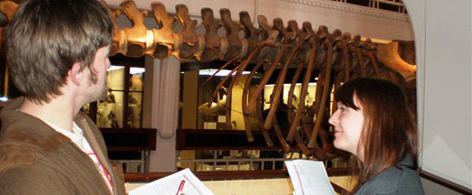Never the Twain Shall Meet
Rowena Beighton-Dykes, Foundation Degree Coordinator, Faculty of Arts, Media and Design, Staffordshire University
r.j.beighton-dykes@staffs.ac.uk
Conference theme selected:
Museum and university partnerships - opportunities and barriers
Keywords:
Diversity, Volunteers, Partnerships, CPD, Vocational
________________
Structure of Paper: Outline of Staffordshire University’s collaborative work with museum sector partners. Descriptions of embedded sector philosophies and modes of working in industry and education that create obstacles and challenges. How a breakthrough has been achieved through imaginative partnership working. Plans for future expansion of collaborative working.
The 2006 Leitch Review of Skills highlighted some key areas that relate to the development of skills through partnership working: the increasing importance of continuous skills development for the UK workforce, employer engagement in training, and the need to increase the number of adults attaining a L4 qualification. The Leitch Review also emphasised the need to deliver demand-led skills training to meet the needs of individuals and employers, whilst developing a culture of continuous learning. The 2008 Museums Association report Developing the Cultural Heritage Workforce acknowledges the need to diversify the workforce, offer wider employment entry opportunities and develop leadership and management skills alongside sector specific knowledge.
Higher Education Institutions traditionally offer tutor-expertise-led qualifications: museums traditionally fill management posts with graduates with a second degree. The Higher Education sector has for many years been required to diversify its intake of students and staffing and measure its success, an area that museums are currently exploring. Training for support staff and some volunteers in the education sector is embedded. Clearly there are areas where good practice should be shared, and some bridges built.
Staffordshire University is an outward facing institution with a history of diversity and partnership working. A substantial amount of training is delivered through the Staffordshire University Regional Federation (SURF) and other external partnerships. The University also offers part-time and short courses, and - unusually - credits volunteer work as part of its undergraduate and postgraduate offer, or as stand-alone CPD. In 2005 through the appointment of a Foundation Degree Coordinator two clear areas relating to the museum and heritage sector emerged: training demand that served the needs of front-of-house staff including volunteers working in museums and heritage venues, and diverse skills development related to conservation, for small numbers in widespread locations, and in part replacement for closing courses in other HEIs
Foundation degrees require industry involvement, and Staffordshire University worked and continues to work with a range of sector organisations, including Ironbridge Gorge Museum, the National Trust, Renaissance West Midlands, the MLA and Birmingham Museum and Art Gallery. Discussions have exposed difficulties on both sides: training volunteers might impact on paid workers’ job security; how was training to be funded? Skills are held in diverse locations and not universities; HE funding is complicated and constricting; isn’t existing sector training sufficient? Is diversity of intake relevant? To move forward and create new skills development opportunities all partners have needed to reflect on their practice and be prepared to work creatively and flexibly.
It is proposed that the Foundation Degree Coordinator at Staffordshire University gives a presentation describing the pathway taken through the difficulties of embedded philosophies and institutional constraints, and describes how successful partnerships and valuable exchanges of knowledge have been nurtured. The presentation will end with an outline of future plans.
